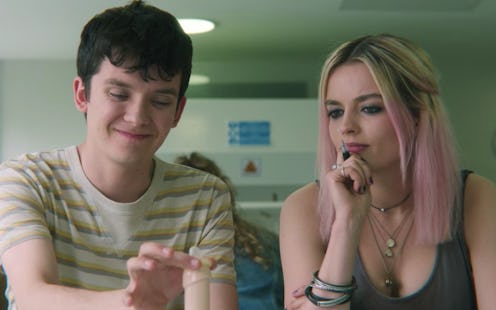Sex & Relationships
After Virtual Schooling, Sex-Ed May Never Look The Same

Ninth graders at Amherst Regional High School in Amherst, Massachusetts, get a more comprehensive sex education than most American students. Thanks in part to their proximity to Tapestry Health, a community-based health care clinic in nearby Northampton, it starts with a full month of sex-ed at the beginning of the year, covering everything from relationships and consent to sexual health. They also recognize “Consent Week” in April, which consists of daily mini-workshops after school, and a consent lesson during their Advisory period.
But this year, as the COVID-19 pandemic shuttered school doors across a country and “classrooms” moved online, all of that supplementary sex education was lost. And Brittni Upchurch, who teaches Health and Physical Education at Amherst, doesn’t know what it’s going to look like when school starts up again.
“If we are in a similar situation in the fall or if there’s some restructuring of school, I know we’re going to have restructure our health class,” Upchurch tells Bustle. “We’ll likely lose some pretty significant curriculum.”
How schools will handle sex education in the fall differs from region to region and even from school to school. That’s perhaps unsurprising when you consider the fact that there are no federal requirements for sex education in American schools — and that only 15 states even require that sex education be medically accurate. But rather than view the COVID-19 pandemic as one more blow to an already fractured and insufficient sex education system, some sex educators are hoping that parents and educators will turn to the internet.
Young people have had little-to-no and very inconsistent experiences around sex ed in their school systems.
Of course, not all online information about sex was created equal — and some information can be downright harmful. Melissa Pintor Carnagey, LBSW, CLC, founder of Sex Positive Families and a parent themself, have structured their life around providing quality online sex education.
“My young people have had little-to-no and very inconsistent experiences around sex ed in their school systems,” Pintor Carnagey tells Bustle. “That’s why it’s even more critical that I, as a parental figure, provide them with the sex-ed that they clearly would not get otherwise.”
When schools closed early due to COVID-19, Sex Positive Families was perfectly positioned to fill the sex education gap. The organization was already offering webinars about puberty, how to talk about pleasure, how to talk about porn, and how to provide sex ed to your teenagers. And with the onset of COVID, they started offering online family workshops for tweens aged eight to 12, although people of all ages are welcome to attend. Pintor Carnagey also teamed up with the site Amaze.org to create age-appropriate sex education videos targeting younger students.
“Video is a really great way to engage different learning styles and gives families something great to talk about together,” Pintor Carnagey says. “It’s really about getting curious together and knowing that it’s not the parents' job to know the answers to all the questions.”
But while they’re comfortable talking to their three kids about sex, Pintor Carnagey knows that not all parents feel the same way. And some just feel like maybe they don’t know enough to be their child’s primary sex educator. For those parents, Pintor Carnagey recommends creating resources that the child can access on their own when they have questions.
“If you have the means, order books to keep in the house so that there’s a home library that young people have access to and can browse any time,” Pintor Carnagey says. “They can also bookmark different online resources on devices the children have access to and just say ‘Any time you get curious about bodies, about sex, about consent, about relationships — about any of these topics — if for any reason you don’t feel comfortable talking to me, or I’m not available, here are some websites that you can go to and the information you want.’”
Even if school reopens in the fall, things are going to look very different.
In addition to the Sex Positive Families website, Pintor Carnagey recommends adding Amaze.org (best for young people who learn well from video), Scarleteen (best for young people who like to read), and Every Body Curious for families. They also encourage parents to tell their kids if they’re feeling uncomfortable talking about these topics and to acknowledge that their discomfort doesn’t mean this topic is wrong or inherently uncomfortable.
“It’s OK to admit and speak your feelings to a young person,” Pintor Carnagey says. “Let kids know that you didn’t have your own resources growing up, and that means it’s intimidating to you.”
Meanwhile, back in Amherst, Upchurch expects that even if school reopens in the fall, things are going to look very different. She suspects that the community health care workers from Tapestry Health, who were so essential to the sex-ed portion of her Health curriculum, might not be able to come and do their work in her classroom.
“It’s going to change a lot,” Upchurch says. “At least next year, if not for a few years to come.”
Experts:
Melissa Pintor Carnagey, LBSW, CLC, sex educator, founder of Sex Positive Families
Brittni Upchurch, Health & PE, Amherst Regional High School